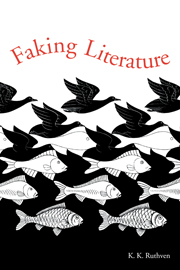Book contents
- Frontmatter
- Contents
- Acknowledgements
- List of abbreviations
- Prologue
- 1 Sampling the spurious
- 2 Framing literary forgery
- 3 Cultivating spuriosity
- 4 Faultlines of authorship
- 5 Fantasies of originality
- 6 Rhetorics of authenticity
- 7 Fake literature as critique
- Epilogue
- Bibliography
- Index of names
- Index of Subjects
6 - Rhetorics of authenticity
Published online by Cambridge University Press: 22 September 2009
- Frontmatter
- Contents
- Acknowledgements
- List of abbreviations
- Prologue
- 1 Sampling the spurious
- 2 Framing literary forgery
- 3 Cultivating spuriosity
- 4 Faultlines of authorship
- 5 Fantasies of originality
- 6 Rhetorics of authenticity
- 7 Fake literature as critique
- Epilogue
- Bibliography
- Index of names
- Index of Subjects
Summary
The continuing success of literary forgeries will not surprise anybody familiar with the scandal of literature itself, which results from its ancient alliance with rhetoric (the art of persuasion) rather than with logic (the science of reasoning) or ethics (the principles of moral conduct). In order to uncover that rhetorical pedigree it is necessary to peel off the moralistic overlay imposed not only on literature by liberal humanist literary studies but also on rhetoric by ethics.
In the final book of his treatise on how to educate an orator, Institutio Oratoria (xii.i.1), Quintilian borrows from the Elder Cato his definition of the orator as vir bonus dicendi peritus (‘a good man, skilled in speaking’). This formulation was to prove strategically useful in humanistic theories of education, where dicendi peritus means speaking well in a morally responsible manner, and the study of rhetoric is legitimated by being made subordinate to ethics. Yet this conception of rhetoric is much more the work of a moral philosopher than a rhetorician, whose skills are described more accurately in the definition of rhetoric given in the second book of Quintilian's treatise (ii.xvii.37): ars bene dicendi (‘the art of speaking well’). For although ethics may resort to rhetoric in order to persuade us to lead morally responsible lives, rhetoric has no need whatsoever of ethics.
- Type
- Chapter
- Information
- Faking Literature , pp. 146 - 170Publisher: Cambridge University PressPrint publication year: 2001



